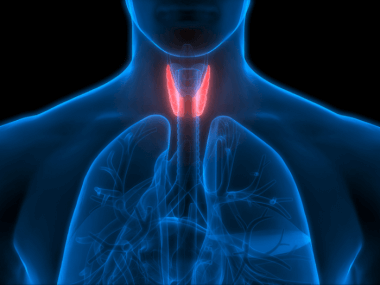What Does the Thyroid Do?
What does the thyroid gland do? What do thyroid tests mean?
I really enjoyed doing last week’s article on , and I hope to do more of them in the future. Today’s subject is about something that is a mystery to most people, including many doctors: the thyroid gland.
What Does the Thyroid Do?
What the heck does the thyroid gland do? Most physicians will tell you “it controls metabolism,” which is what we all learned in medical school. That statement is basically the same as saying “it’s really complicated and I don’t understand it.” It also presumes that the listener knows what metabolism is, and why controlling it is important. Well, I’ll do my best to actually explain the thyroid gland. This week I’ll tackle what it does, and next week I’ll talk about problems with the thyroid gland.
Where is the Thyroid Located?
The thyroid gland itself is located on the neck, just below the Adam’s apple. It’s fairly flat, so you normally can’t feel it (unless there’s a problem). The main job of the thyroid is to put out thyroid hormones, which are a pair of chemicals that float through the bloodstream and, you guessed it, control metabolism.
What Is the Pituitary Gland?
But the thyroid isn’t a smart organ; it doesn’t know how much thyroid hormone to put out to do its metabolism controlling. That job is the duty of the pituitary gland, which is located at the bottom of your brain. The pituitary gland is the control center for many glands besides the thyroid, but I’ll cover that in a later article.
The Thyroid and Pituitary Work Together
The pituitary controls the thyroid by putting out something called TSH, or thyroid stimulating hormone. TSH tells the thyroid how much thyroid hormone the body needs; if the body needs a lot of thyroid hormone, the TSH level goes up, and if the body has enough, the TSH level goes down.
That’s a really important thing to remember, because it gets many people confused. A high TSH means there isn’t enough thyroid hormone, whereas a low TSH means there’s too much. It’s much like a thermostat that tells the furnace to get hot when the house is cold, and to cool down when the house is hot.
What Do Thyroid Hormones Do?
The best analogy I could find to explain the function of thyroid hormone comes from an unlikely place: auto mechanics. Your car needs fuel to run; most cars use gasoline as their fuel. Gas gets burned in the engine, which ultimately turns the wheels of the car so you can drive to the petting zoo, or wherever else you want to go.
The speed of the car depends on how much gas is let in the engine to be burned. The more gas, the more the engine revs. The carburetor, or the fuel injectors, are the parts of the car that control the amount of gas going to the engine, telling the engine how high to rev.
In the same way, the body needs fuel for you to do things, like getting out of your car and petting the llamas. It also needs energy to keep the heart beating, the lungs breathing, and the spleen, well, spleening. The burning of energy to do all of these things is called the metabolism. Thyroid hormone is much like the carburetor. Low thyroid hormone levels make the body burn less energy, whereas high levels make the body burn more energy.
How Does the Thyroid Affect Metabolism?
That doesn’t mean that high thyroid levels help you run fast, but it does mean that people with overactive thyroid glands tend to have higher heart rates; their muscles shake, and they lose weight. This is called hyperthyroidism. People with under-active thyroid glands, on the other hand, have slower heart rates, are fatigued, and gain weight. That is called hypothyroidism. Children use much of their energy to grow, so children with hypothyroidism don’t grow well.
I am sure there are people out there thinking, “I sure wish I had hyperthyroidism so I could lose weight.” In fact, some doctors give extra thyroid hormone supplements to help people lose weight. That is a big mistake, as hyperthyroidism is actually more dangerous than hypothyroidism. Besides, what do you think the pituitary gland does when you take extra thyroid hormone? It lowers the TSH, which makes the thyroid gland put out less of its own hormones.
What are Thyroid Tests?
I’ll end this week’s article by explaining the significance of thyroid blood tests, which are extremely confusing to both doctors and patients. There are three main levels of thyroid hormones that are important: The TSH level, which we know the pituitary gland releases, and levels of two hormones released by the thyroid itself, known as T3 and T4. To make things even more confusing, there are two types of T3 and T4 found in the blood. The majority of thyroid hormone is bound to protein and is inactive; the active portion is present in very low concentrations and is called the free T3 and Free T4. Unfortunately, the standard tests for T3 and T4 test for the total T3 and T4, not the more important free hormone concentrations. That can make these numbers quite misleading.
So, here are my Quick and Dirty Tips for interpreting thyroid lab tests (listen up, doctors):
The TSH is most important: The TSH level tells us the pituitary gland’s opinion of the need for thyroid hormone. The pituitary is much smarter than doctors, so if the TSH level is in the normal range, most of the time, the levels of T4 and T3 are good.
Use Free Hormone Tests: We now have good tests to determine the levels of Free T3 and Free T4 only, so you shouldn’t get tested for the total T3 and T4; that only adds to the confusion. Most primary care doctors and endocrinologists understand this, but many other doctors order the total T3 and T4 and get confused with the result. I can’t complain, because they send these patients to me so I can interpret the results.
Sorry I couldn’t give a more precise explanation of what thyroid hormones do than to call it a carburetor, but it beats telling you “It controls your metabolism.” I will post some more details on the thyroid hormone levels on my facebook page. Stay tuned for the next article where I will cover thyroid problems.
You can also check out Girlfriend MD’s article “Do You Need Hormone Balancing?” for more information.
If you have topics that you want me to cover, send them to create new email, or you can submit them to me on twitter or my Facebook page.
Let me once again remind you that this podcast is for informational purposes only. My goal is to add to your medical knowledge and translate some of the weird medical stuff you hear, so when you do go to your doctor, your visits will be more fruitful. I don’t intend to replace your doctor; he or she is the one you should always consult about your own medical condition.
Catch you next time! Stay Healthy!





